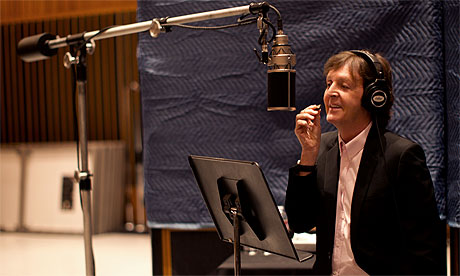Paul McCartney's Kisses on the Bottom: Jamie Cullum's review
Paul McCartney's new album, Kisses on the Bottom, which you can listen to here, sees him turning his hand to jazz-age standards. And the result, writes Jamie Cullum, is a triumph
The Beatles always had a soft spot for the era of songwriting that came before they invented the modern rock band. It's nice of them really, considering that by the 70s the genre they helped define had made dinosaurs of the likes of Frank Sinatra (who later sang the Beatles' Something and Yesterday). Among the many things that made them unique, the ghosts of Cole Porter, Fats Waller and Harold Arlen helped give the Beatles the tools to experiment with the kind of structure and melody that gave birth to some of their greatest songs.
The cheekily titled Kisses on the Bottom is Paul McCartney's tribute to the songs he heard his father play at the piano when he was a boy. These tunes were never dismissed by McCartney as "music his parents listened to" as many of his generation subsequently would when Beatlemania took hold. It is a circle he has been hoping to complete for many years.
It's hard to imagine what there is to add to the canon of great American songbook albums – between the legacy of the great crooners and the more recent world-dominating sound of Michael Bublé or Rod Stewart's efforts, where is Sir Paul's going to fit? The answer is in this record's simplicity. Only someone with so little left to prove could offer up an album that never tries to out-play, out-sing or out-croon anyone. He shows immense respect for the art form as he swaps his role from songwriter to interpreter.
It is immediately apparent from the opening song, I'm Gonna Sit Right Down and Write Myself a Letter, that while no broad risks are being taken, there are some are subtle and effective changes. The gentle comping of Diana Krall's piano, the swish of Karriem Riggins' drums and the lushness of Jonny Mandel's strings may be familiar and comfortable, but Paul's voice sounds different. He makes little attempt to croon or adopt that manly braggadocio often associated with this music. Instead his voice focuses on tone, intonation and timing – all delivered with a whisper that, while gentle, fills the sound with its richness.
It is a move that takes you by surprise when you realise McCartney is exploring an area of his voice that we, and possibly he, had never even heard before. He is singing in a higher register than we expect of him; but this gamble serves to deliver an approach to this music that is achingly honest. He may still be playing a part but it's more Chet Baker than Sinatra; more Billie Holiday than Bublé.
The supporting cast of Krall and band, producer Tommy LiPuma and legendary recording engineer Al Schmitt provide an unwaveringly tasteful landscape for McCartney to sing over. While it all may be too smooth for some, I found myself applauding their resistance to the more robust sound of a big band and tight, high-octane arrangements. It takes away any whiff of this resembling a Vegas review show. The simplicity of the piano trio with guitar and a few dashes of strings gives the set an informality that only adds to its charm. If anything, McCartney has taken his lead from Krall's own take on the standards – classy, spare, musical and modest.
The repertoire itself is often pleasantly surprising. There are some familiar faces, but most selections have an air of the forgotten gem about them. More I Cannot Wish You, taken from the Guys and Dolls musical, is notable for not being included in the movie version, and thus rarely heard outside the theatre. It's a stunningly direct song about parenthood and guardianship that echoes the clarity of Hey Jude. Bye Bye Blackbird is taken at such a slow tempo you wonder how it might be sustained over the song's duration. McCartney resists the temptation to fill in the gaps and lays blissfully back on the beat like a Lester Young saxophone solo. Even the slightly twee selections have their place in this puzzle. When he sings My Very Good Friend the Milkman and Inchworm we are reminded this is the man who gave us When I'm Sixty Four, Maxwell's Silver Hammer and Honey Pie.
McCartney's two original selections stand nose to nose with the other songs without a trace of inauthenticity. My Valentine, featuring Eric Clapton, is a sombre love song from a forgotten Broadway show while the shamelessly romantic Only Our Hearts, featuring Stevie Wonder's harmonica, had me checking the credits to make sure it wasn't Gershwin.
McCartney has said part of the joy of making his first two solo albums was that he could relinquish the pressure of being a Beatle and just enjoy making music. That sounds like what he is doing here. Though some may be disappointed by the sheer tastefulness of the whole affair, this album sounds like a holiday, a smile, a love letter. Paul McCartney has allowed himself to luxuriate in the glory of songs by some of the other greatest songwriters of all time, played and recorded by some of the best in the business. It's not only a luxury he is allowed, it is one we should be grateful for.

'It sounds like a love letter' … Jamie Cullum on Paul McCartney's new album

No hay comentarios:
Publicar un comentario